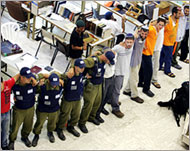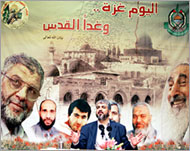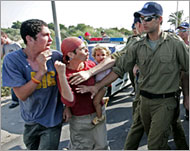Second day of Gaza evictions begin
A large force of Israeli soldiers have marched into the extremist Gaza Jewish settlement of Kfar Darom at daybreak, beginning the second day of forcible eviction of all Jewish settlers remaining in the Gaza Strip.

Thousands of soldiers on Thursday entered on foot from a side gate at the south side of the settlement after settlers barricaded the main entrance.
Officers said they expected stiff opposition from an estimated 2000 residents and other opponents of the Gaza withdrawal.
The forces quickly surrounded the settlement’s synagogue and three nearby buildings where people were barricaded inside. Hundreds of people were in the synagogue, and many others were on the roof, which fortified with razor wire.
Cement barriers with the words “God is king” written on them lined the road to the synagogue.
A small group of observant teenagers with skullcaps on their heads confronted a group of soldiers, driving a female soldier to tears. “What are you doing? Are you crazy?” they screamed.
While most of the Israeli forces in Gaza were concentrated in Kfar Darom, troops also returned to Neve Dekalim, the focus of eviction operations on the first day.
In lightning sweeps on Wednesday, Israeli troops cleared out Gaza settlements one after the other, shedding tears alongside settlers.
 |
|
Israeli forces joined settlers in |
And after the first day of a mission scheduled to take three weeks, more than half the settlements were empty, a huge step towards ending Israel‘s 38-year occupation.
In Wednesday’s forcible evictions, Orthodox Jews sobbed as they carried sacred Torah scrolls out of a synagogue.
Children dressed like Holocaust victims raised their hands in symbolic surrender as police led them to a waiting bus. And a rabbi talked a despondent young man off a roof.
Feared violence
The feared violence did not materialise in Gaza, but it hit the West Bank instead.
A Jewish settler, apparently despondent over the first-ever eviction of veteran settlements from Gaza or the West Bank, opened fire at Palestinian workers, killing four.
Hamas pledged revenge, but a spokesman for the group indicated that the target would not be the exiting Israelis in Gaza, as Hamas shared the Palestinian interest of seeing the Israelis leave quickly, allowing for Palestinian control over the whole territory for the first time.
Israel captured the territory from Egypt in the 1967 Middle East war.
 |
|
Hamas has said it will not target |
After the shooting, three mortar shells fired from Palestinian territory exploded near emptied Gaza settlements. No one was hurt.
Eleven of the 21 Gaza settlements were empty as of early Thursday morning.
Only 60 of the 480 families remained in Neve Dekalim, but hundreds of hardline “reinforcements” from the West Bank, most of them teenagers, were holed up in a synagogue, pledging to resist eviction.
Appeal
Prime Minister Ariel Sharon appealed to settlers not to take out their anger on the soldiers.
“I am responsible,” he said. “Hit me, hit me.”
Sharon, until two years ago the main engine behind settlement construction and expansion, said “it’s impossible to watch this … without tears in the eyes”.
Soldiers joined protesters in prayer before evicting them.
An elderly rabbi hugged a Torah scroll as he was escorted out of a synagogue. A young man read from his prayer book as soldiers carried him to a bus. Teenagers burned tyres in streets in last acts of defiance.
The day’s worst act of protest was the self-immolation of a 54-year-old woman from the West Bank at a police roadblock in southern Israel.
She suffered life-threatening burns on 70% of her body, police and hospital officials said.
|
“I am responsible. Hit me, hit me … it’s impossible to watch this … without tears in the eyes”
Ariel Sharon, |
Under a willow tree at a children’s nursery, mothers clutched their babies, soldiers carried toddlers, settlers ripped their clothes in mourning and troops loaded diapers and toys onto buses for evacuation.
A female soldier with tears in her eyes held a toddler in her arms, gave him some candy and implored: “Where is his mother?” Another soldier waved away flies from an infant lying in a stroller.
In Neve Dekalim, one man stood before a line of soldiers and held up his daughter, about 10-years-old.
“Here, take her. Expel her. Please take her, you are such a hero,” he said, pouring scorn on the troops. The little girl, crying, looked up at the policeman and her father in sad confusion.
Another man who had been forced onto a bus held his infant nephew out of the window, shouting to the soldiers: “You want him?”
Disengagement
Sharon proposed his “disengagement plan” two years ago to ease Israel‘s security burden and help preserve Israel‘s Jewish character by placing Gaza‘s 1.3 million Palestinians outside the country’s boundaries.
Palestinian fighters are portraying the pullout as a victory for their bombings and rocket attacks, and some Israelis fear they will resume their violence once the Gaza withdrawal is complete.
 |
|
Settlers have said they would |
Israelis and Palestinians are cooperating to prevent violence during the pullout, but in recent weeks it is been Jewish extremists who have caused the most concern.
Wednesday’s attack was the second on Palestinians by Israelis in two weeks. On 4 August, a 19-year-old soldier opened fire on a bus, killing four Israeli Arabs.
Attack
Sharon denounced the Wednesday shooting as “an act of Jewish terror against innocent Palestinians out of twisted thinking, aimed at stopping the disengagement”.
The gunman, identified as Asher Weisgan, 40, from the West Bank settlement of Shvut Rahel, was a driver who transported Palestinian labourers to the industrial zone of the nearby settlement of Shilo every day.
At the end of the work day, he picked up the workers and briefly stopped at a security post.
He then got out of his car, took a rifle from the security guard at knifepoint and fired from close range on two workers sitting in his car. Weisgan kept shooting, killing a third worker and wounding two others outside the car. One died later.